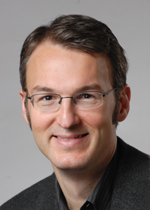Fall 2018 Joint CSC@USC/CommNetS-MHI Seminar Series
 |
Murat Arcak,
University of California, Berkeley
|
Abstract
Finite abstractions of continuous dynamical systems play a central role in synthesizing controllers that enforce complex specifications, such as those expressed in temporal logic, and enable the designer to leverage tools from model checking and reactive synthesis. The resulting controller is symbolic, meaning that it only requires knowledge of quantized states that represent the currently occupied partition of the state space. Existing computational tools for this approach have been limited to small systems because both the abstraction and synthesis steps suffer from severe time and space bottlenecks as the system dimension grows. This talk will present recent results that overcome these bottlenecks by exploiting structural system properties. These results include: (1) taking advantage of monotonicity properties of the dynamical model for efficient reachability computations, (2) using sparsity structures in the dependency graph of state variables for parsimonious abstraction algorithms that dramatically reduce runtime, and (3) dividing the control synthesis task into sub-problems of manageable size with compositional procedures. The results will be illustrated with several practically motivated examples.
Biosketch
Murat Arcak is a professor at UC Berkeley with appointments in the Department of Electrical Engineering and Computer Sciences and Department of Mechanical Engineering. He received the B.S. degree in Electrical Engineering from the Bogazici University, Istanbul (1996) and the M.S. and Ph.D. degrees from the University of California, Santa Barbara (1997 and 2000). His research is in dynamical systems and control theory with applications to synthetic biology, multi-agent systems, and transportation. He received a CAREER Award from the National Science Foundation in 2003, the Donald P. Eckman Award from the American Automatic Control Council in 2006, the Control and Systems Theory Prize from the Society for Industrial and Applied Mathematics (SIAM) in 2007, and the Antonio Ruberti Young Researcher Prize from the IEEE Control Systems Society in 2014. He is a member of SIAM and a fellow of IEEE.
